|
|
|
Sort Order |
|
|
|
Items / Page
|
|
|
|
|
|
|
| Srl | Item |
| 1 |
ID:
115351
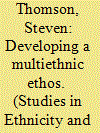

|
|
|
|
|
| Publication |
2012.
|
| Summary/Abstract |
This examination of local government reform in The Gambia asserts that - contra Mamdani's (1996) generalisations that colonial policies of indirect rule in Africa universally determined that ethnicity is the master code through which ordinary people interact with local manifestations of the state - in some cases colonial administration contributed to more pluralist local politics. Further, I argue that the logics of developmentalism have joined with local models of political legitimacy to generate communities that actively choose to define themselves explicitly as multiethnic entities. My case study focuses on the process conducted in one village of drafting a constitution for its Village Development Committee in anticipation of the Local Government Act of 2000. That a local community took advantage of such a critical juncture to reassert its own moral order is not surprising; however, that this local moral order explicitly recognises and protects ethnic diversity runs counter to dominant narratives about Africa that equate ethnic diversity with conflict.
|
|
|
|
|
|
|
|
|
|
|
|
|
|
|
|
| 2 |
ID:
123763
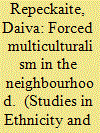

|
|
|
|
|
| Publication |
2013.
|
| Summary/Abstract |
Ethnic migration from the former Soviet Union to Israel is widely considered to be a 'laboratory of ethnicity'. Most of the research into this subject focuses on the cultural and linguistic factors of identity restructuring, whereas critical engagement with social status, class, and urban environment is a much newer development. Social, economic, and urban explanations of the remaining relevance of 'old' (ex-USSR) identifications are particularly needed in the face of increasing alienation among various disadvantaged groups in Israel and the mobilization of large numbers of Russian-speakers around nationalist political parties. On the basis of interviews, participant observations, and media analysis, this article argues that simultaneously deterritorialized and reterritorialized ideas of home and belonging shape this group's social and political mobilization patterns in contested city spaces. Further, I suggest that nationalist mobilization is a strategy to reach beyond ethno-politics and make majority rather than minority claims.
|
|
|
|
|
|
|
|
|
|
|
|
|
|
|
|
| 3 |
ID:
123761
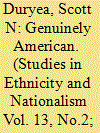

|
|
|
|
|
| Publication |
2013.
|
| Summary/Abstract |
Especially during the turbulent years of the immediate postwar period, Croatian-Americans found expediency in positioning their ethnic culture within the realm of acceptable white manhood and peaceful civilization. To be accepted was to be white, or to try to be white. Accordingly, Croatian-Americans attempted to qualify themselves as authentic whites whose ethnicity meshed perfectly with the American way. This study examines the Croatian Fraternal Union's Zajednicar newspaper to demonstrate that during the postwar period, which was characterized by converging anxieties over disintegrating gender roles, acceptable whiteness, as structured by Protestant old immigrant Americans, and the perceived communist threat, Croatian-Americans in Pittsburgh qualified themselves as authentically white and genuine American men and women to escape accusations of subversion.
|
|
|
|
|
|
|
|
|
|
|
|
|
|
|
|
| 4 |
ID:
115354


|
|
|
|
|
| Publication |
2012.
|
| Summary/Abstract |
Houston Stewart Chamberlain is best known as an anti-Semite; however, the British-born independent scholar was also a fervent German nationalist. His major anti-Semitic work, Die Grundlagen des 19. Jahrhunderts (The Foundations of the Nineteenth Century), was first published in 1899 and masqueraded as a history of Europe. His most important nationalist works were his Kriegsaufsätze (war essays), published beginning in 1914. This article examines the discursive methods used by Chamberlain to create images of the German Self and its enemy Other in both Die Grundlagen and the war essays. The enemy Other in Die Grundlagen was portrayed as the destructive force represented by Jews; the Self was the creative or regenerative will and abilities of Aryans. In the war essays, the enemy Other was, to start with, the Russians, French, and English, and, later on, just the English (Chamberlain did not refer to the British). The war essays were subject to censorship and so could only make negative references to Jews 'between the lines'; Chamberlain, however, was careful to point out to his readers that they should look for hidden messages.
|
|
|
|
|
|
|
|
|
|
|
|
|
|
|
|
| 5 |
ID:
115348
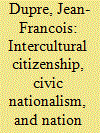

|
|
|
|
|
| Publication |
2012.
|
| Summary/Abstract |
This article analyses the current citizenship-nation building nexus in Québec in light of government publications and recent public discourses on ethnocultural pluralism and immigrant integration. First, the article surveys the changing relationship between Québécois nationalism and citizenship according to political circumstances in Québec, suggesting that debates over immigrant integration have played a central role in the creation of a civic Québécois identity, initially based on French as the public language and interculturalism. The article then analyses recent public debates surrounding 'reasonable accommodation' in Québec, and identifies a growing emphasis on laïcité - the secularisation of the public space - as identity marker. This article attributes this growing focus on secularism to dissatisfied nationalists seeking to reclaim the cultural prominence of the French Canadian majority in provincial institutions and press for measures aimed at enhancing Québec's distinctiveness and autonomy within the Canadian institutional framework. On a more normative note, the article argues that while language nationalism is reconcilable with ethnocultural pluralism, recent discourses on the secularisation of the public space constrain the emergence of an openly pluralistic stance on national belonging in the province, and undermines the legitimacy of Québec interculturalism.
|
|
|
|
|
|
|
|
|
|
|
|
|
|
|
|
| 6 |
ID:
115349
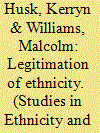

|
|
|
|
|
| Publication |
2012.
|
| Summary/Abstract |
In this article we examine the complex processes involved in small-scale ethnicity emergence and legitimation, and highlight the multi-dimensional elements present in moving from a strong regional identity to an externally legitimate ethnic group. We use Cornwall as a case study: administered as an English county, there has been a historic ethno-cultural movement for recognition alongside recent inclusion in national statistics; however, legitimation by external elites has been problematic. The first sections outline the Cornish as a group; we argue that however one conceptualises 'ethnicity', the people of Cornwall must constitute such a group. We examine the dichotomous effects of the interplay between strong regional assertion and a Cornish ethnicity more formally. In the latter sections we apply these arguments to broader sociological discussions around the legitimation of particular groups, and show that the Cornish are indicative of the wider theoretical literature. In conclusion, we assert that the Cornish are representative of the push/pull mechanisms felt acutely in any core/periphery power relations, and should be seen as central to emerging small-scale ethnic groups more generally.
|
|
|
|
|
|
|
|
|
|
|
|
|
|
|
|
| 7 |
ID:
123764
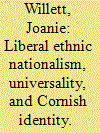

|
|
|
|
|
| Publication |
2013.
|
| Summary/Abstract |
Within the liberal paradigm, ethnic nationalism and identity are often conceptualized as 'exclusive', lacking the capacity for universal membership (Ipperciel 2007; Kohn 1946; Kymlicka 1995), and is juxtaposed against 'inclusive', civic forms of identity. This article problematizes this claim, asking whether civic territorial identities also contain their own forms of exclusion. Using the New Regionalism and the identity politics of contemporary economic development, this article explores civic/ethnic identities in Cornwall in the context of Agnew's (2005) observations about contemporary liberal values. The article finds that, in Cornwall, civic forms of territorial identity that distance themselves from ethnic Cornishness are more exclusive than contemporary ethnic nationalism in the region, introducing economic rather than ethnic exclusions. This raises questions about why ethnic identity can be negatively characterized in regional development discourses and what the effects of this might be.
|
|
|
|
|
|
|
|
|
|
|
|
|
|
|
|
| 8 |
ID:
115352
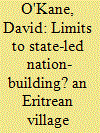

|
|
|
|
|
| Publication |
2012.
|
| Summary/Abstract |
Since independence in the early 1990s, the east African state of Eritrea has been ruled by a self-consciously nationalist and modernising authoritarian regime, which seeks to build an Eritrean national consciousness among the country's 3.5 million people via top-down strategies of intervention in rural communities. These are not limited to the use of cultural interventions intended to revise people's identities. They also take the form of state-led development strategies, including land nationalisation. In a village in highland Eritrea, the residents oppose some of the projects of the state while adopting parts of the national identity proffered to them by the state. The author argues that this case suggests a new way of thinking about the ways in which national identities and nation-states are constructed - one that reconsiders the relationship between nationalism and resistance, and between nation-building elites and communities in resistance.
|
|
|
|
|
|
|
|
|
|
|
|
|
|
|
|
| 9 |
ID:
123765
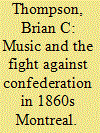

|
|
|
|
|
| Publication |
2013.
|
| Summary/Abstract |
In this article, I examine how music was used as an expression of French-Canadian identity in nineteenth-century Montréal. Focusing on the 1860s and a group of musicians and intellectuals opposed to Confederation, I explore their efforts to use performance, criticism, and composition in the (re)construction of French-Canadian identity. My main sources of information are la Presse and l'Union nationale, two newspapers of the time that were strongly opposed to Confederation and which were vigorous in the promotion of musical events. Through an examination of the musical and political activities advertised and reviewed in the pages of these and other newspapers, we shall see how culture was used as a means to strengthen French-Canadian nationalism. At the same time, while the musicians themselves may have sought an independent Québec, they remained open to other cultures and through their collaboration with non-francophones articulated a form of civic nationalism.
|
|
|
|
|
|
|
|
|
|
|
|
|
|
|
|
| 10 |
ID:
115353


|
|
|
|
|
| Publication |
2012.
|
| Summary/Abstract |
The term 'anti-Semitism' indicates how far the anti-Jewish literature of the late nineteenth and early twentieth centuries was charged with themes, figures, and stereotypes from contemporary discourses on the Orient. An increasing tendency to 'orientalise' the European Jews had raised questions about the supposed origin of the Jewish people in the Near East and its relationship to other - current or historical - peoples. Focusing on the Nazi racial scientist Ludwig Ferdinand Clauß, the article draws attention to the impact of Near Eastern anthropology, ethnology, and archaeology in the Age of Empire on modern anti-Semitism and sheds light on structural convergences and differences between colonial or 'Orientalist' discourses and anti-Semitism in general. With reference to the scholarly literature of the time, Clauß made a sharp distinction between 'Oriental' or 'Semitic' Arabs and 'Near Eastern' Jews. Thereby, the romanticised Arab Orient served as an antipole to a 'Nordic' Europe, and as such was finally able to advance to a positive alternative. The Jewish Orient, on the other hand, embodied a threatening ambivalence and contrariety, which from the very beginning precluded romanticisation and identification.
|
|
|
|
|
|
|
|
|
|
|
|
|
|
|
|
| 11 |
ID:
123766


|
|
|
|
|
| Publication |
2013.
|
| Summary/Abstract |
The creation of a national identity shared by the whole population becomes increasingly difficult in individualizing and globalizing national societies. The national population fragments into many lifestyle groups with very different social and cultural orientations. The enactment of these different lifestyle identities during leisure activities accentuates these differences. However, these different identities are sometimes performed on the same spatial stage. The main part of this article analyses the use of the dike along the river Linge, a part the Rhine estuary, which, lined with apple trees, cuts through an iconic Dutch river landscape with polders, old villages and meadows with quietly grazing cattle. Especially during the weekends, it is a stage crowded by walkers, cyclists, classic car drivers, and motorcyclists. The importance attached to this river dike is linked to a shared traditional form of Dutch collective national identity. The different uses of the river dike are based to the diverging values on which the different lifestyles are based. This results in conflicts over the use of and access to the dike. The role of the state in regulating these conflicts results in a more limited form of national identity.
|
|
|
|
|
|
|
|
|
|
|
|
|
|
|
|
| 12 |
ID:
123762
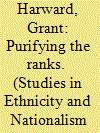

|
|
|
|
|
| Publication |
2013.
|
| Summary/Abstract |
During the Second World War, the Romanian Armed Forces joined in the conflict between Nazi Germany and Soviet Russia. The Romanian Army's contribution to the Axis war effort has been largely forgotten or sidelined since the war. Similarly, Romania's minorities and their military service or restriction from military service has been overlooked. Romania's expansion after the First World War greatly increased the number of minorities in the country and also those serving in the military. The way the Romanian Armed Forces dealt with minorities and their contribution to the Romanian war effort should not be forgotten as the true extent and depth of the war on the Eastern Front is being revealed. Romanian nationalist and ethnic policies affected the ranks as much as it shaped the rest of its wartime policy of ethnic 'purification'.
|
|
|
|
|
|
|
|
|
|
|
|
|
|
|
|
| 13 |
ID:
123760
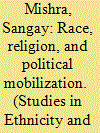

|
|
|
|
|
| Publication |
2013.
|
| Summary/Abstract |
In the days and months following 11 September 2001, South Asians in the United States were lumped together and racialized as 'outsiders' and 'threatening'. The lumping of South Asians existed alongside their differential targeting based on particular religious identities such as Hindu, Muslim, and Sikh. The religious identity not only shaped and calibrated the racial hostility against different South Asian groups but also framed their responses to racial attacks. The primacy of religious identities in framing the group response to racial hostility made it difficult to build broader panethnic solidarity, thereby challenging the existing understanding of the dynamics of panethnic identity formation and mobilization. The foregrounding of religious identity by different South Asian groups was, in fact, in broad consonance with the multicultural institutional and ideological framework that provides institutional and discursive avenues for the deployment of exclusive and immutable identities.
|
|
|
|
|
|
|
|
|
|
|
|
|
|
|
|
| 14 |
ID:
115350


|
|
|
|
|
| Publication |
2012.
|
| Summary/Abstract |
Flemish nationalism is back on the scene. The Nieuw-Vlaamse Alliantie (N-VA), the political voice of democratic Flemish nationalism, emerged as the big winner of Belgium's 7 June 2009 regional elections. To a significant extent, the N-VA owes its success to the charismatic leadership of its chairman, Bart De Wever. This article investigates the nature of De Wever's charismatic authority, as well as its tenability. As the N-VA becomes a more prominent participant in the Flemish government, will the effect of De Wever's charisma wane? If the success of the N-VA is not structural but tied to the charisma of its chairman, will the party lose its prominence if De Wever fades?
|
|
|
|
|
|
|
|
|
|
|
|
|
|
|
|
|
|
|
|
|